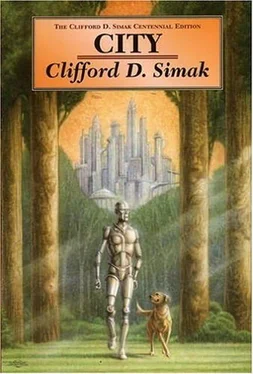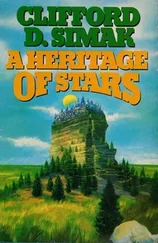Clifford Simak - City
Здесь есть возможность читать онлайн «Clifford Simak - City» весь текст электронной книги совершенно бесплатно (целиком полную версию без сокращений). В некоторых случаях можно слушать аудио, скачать через торрент в формате fb2 и присутствует краткое содержание. Жанр: Фантастика и фэнтези, на английском языке. Описание произведения, (предисловие) а так же отзывы посетителей доступны на портале библиотеки ЛибКат.
- Название:City
- Автор:
- Жанр:
- Год:неизвестен
- ISBN:нет данных
- Рейтинг книги:3 / 5. Голосов: 1
-
Избранное:Добавить в избранное
- Отзывы:
-
Ваша оценка:
- 60
- 1
- 2
- 3
- 4
- 5
City: краткое содержание, описание и аннотация
Предлагаем к чтению аннотацию, описание, краткое содержание или предисловие (зависит от того, что написал сам автор книги «City»). Если вы не нашли необходимую информацию о книге — напишите в комментариях, мы постараемся отыскать её.
City — читать онлайн бесплатно полную книгу (весь текст) целиком
Ниже представлен текст книги, разбитый по страницам. Система сохранения места последней прочитанной страницы, позволяет с удобством читать онлайн бесплатно книгу «City», без необходимости каждый раз заново искать на чём Вы остановились. Поставьте закладку, и сможете в любой момент перейти на страницу, на которой закончили чтение.
Интервал:
Закладка:
The dog's thoughts seeped into his brain. "You can't do it, pal," said Towser.
Fowler's answer was almost a wail. "But I have to, Towser. That's what I went out for. To find what Jupiter really is like. And now I can tell them, now I can bring them word."
You should have done it long ago, said a voice deep inside of him, a faint, far-off human voice that struggled up through his Jovian self. But you were a coward and you put it off – and put it off. You ran away because you were afraid to go back. Afraid to be turned into a man again.
"I'll be lonesome," said Towser, and yet he did not say it. At least there were no words – rather a feeling of loneliness, a heart-wrench cry at parting. As if, for the moment, Fowler had moved over and shared Towser's mind.
Fowler stood silent, revulsion growing in him. Revulsion at the thought of being turned back into a man – into the inadequacy that was the human body and the human mind.
"I'd come with you," Towser told him, "but I couldn't stand it. I might die before I could get back. I was nearly done for, you remember, I was old and full of fleas. My teeth were worn right down to nubbins and my digestion was all shot. And I had terrible dreams. Used to chase rabbits when I was a pup, but towards the last it was the rabbits that were chasing me."
"You stay here," said Fowler. "I'll be coming back."
If can make them understand , he thought. If only I can. If I can explain.
He lifted his massive head and stared at the lift of hills which swelled to mountain peaks shrouded in the rose and purple mist. A lightning bolt snaked across the sky and the clouds and mist were lighted with a fire of ecstasy.
He shambled forwards, slowly, reluctantly. A whiff of scent came down the breeze and his body drank it in – like a cat rolling in catnip. And yet it wasn't scent – although that was the closest he could come to it, the nearest word he had. In years to come the human race would develop a new terminology.
How could one, he wondered, explain the mist that drifted on the land and the scent that was pure delight. Other things they'd understand, he knew. That one never had to eat, that one never slept, that one was done with the whole range of depressive neurosis of which Man was victim. Those things they would understand, because they were things that could be told in simple terms, things which could be explained in existent language.
But what about the other things – the factors that called for a new vocabulary? The emotions that Man had never known. The abilities that Man had never dreamed of. The clarity of mind and the understanding – the ability to use one's brain down to the ultimate cell. The things one knew and could do instinctively that Man could never do because his body did not carry the senses with which they could be done.
"I'll write it down," be told himself. "I'll take my time and write it down."
But the written word, he realized, was a sorry tool.
A televisor port bulged out of the crystalline hide of the dome and he shambled towards it. Rivulets of condensed mist ran down across it and he' reared up to stare straight into the port.
Not that he could see anything, but the men inside would see him. The men who always watched, staring out at the brutality of Jupiter, the roaring gales and ammonia rains, the drifting clouds of deadly methane scudding past. For that was the way that men saw Jupiter.
He lifted a forepaw and wrote swiftly in the wetness on the port-printing backwards.
They had to know who it was, so there would be no mistake. They had to know what co-ordinates to use. Otherwise they might convert him back into the wrong body, use the wrong matrix and he would come out somebody else – young Allen, maybe, or Smith, or Pelletier. And that might well be fatal.
The ammonia ran down and blurred the printing, wiped it out. He wrote the name again.
They would understand that name. They would know that one of the men who had been converted into a Loper had come back to report.
He dropped to the ground and whirled around, staring at the door which led into the converter unit. The door moved slowly, swinging outwards.
"Good– bye, Towser," said Fowler softly.
A warning cry rose in his brain: It's not too late. You aren't in there yet. You still can change your mind. You still can turn and run.
He plodded on, determined, gritting mental teeth. He felt the metal floor underneath his pads, sensed the closing of the door behind him. He caught one last, fragmentary thought from Towser and then there was only darkness.
The conversion chamber lay just ahead and he moved up the sloping ramp to reach it.
A man and a dog went out, he thought, and now the man comes back.
The press conference had gone well. There had been satisfactory things to report.
Yes, Tyler Webster told the newsmen, the trouble on Venus had been all smoothed out. Just a matter of the parties involved sitting down and talking. The life experiments out in the cold laboratories of Pluto were progressing satisfactorily. The expedition for Centauri would leave as scheduled, despite reports it was all balled up. The trade commission soon would issue new monetary schedules on various interplanetary products, ironing out a few inequalities.
Nothing sensational. Nothing to make headlines. Nothing to lead off the newscast.
"And Jon Culver tells me," said Webster, "to remind you gentlemen that today is the one hundred and twenty-fifth anniversary of the last murder committed in the Solar System. One hundred and twenty-five years without a death by premeditated violence."
He leaned back in the chair and grinned at them, masking the thing he dreaded, the question that he knew would come.
But they were not ready to ask it yet – there was a custom to be observed – a very pleasant custom.
Burly Stephen Andrews, press chief for Interplanetary News, clearing his throat as if about to make an important announcement, asked with what amounted to mock gravity:
"And how's the boy?"
A smile broke across Webster's face. "I'm going home for the weekend," he said. "I bought my son a toy."
He reached out, lifted the little tube from off the desk.
"An old– fashioned toy," he said. "Guaranteed old-fashioned. A company just started putting them out. You put it up to your eye and turn it and you see pretty pictures. Coloured glass falling into place. There's a name for it-"
"Kaleidoscope," said one of the newsmen quickly. "I've read about them. In an old history on the manners and customs of the early twentieth century."
"Have you tried it, Mr. Chairman?" asked Andrews.
"No," said Webster. "To tell the truth, I haven't. I just got it this afternoon and I've been too busy."
"Where'd you get it, Mr. Chairman?" asked a voice. "I got to get one of those for my own kid."
"At the shop just around the corner. The toy shop, you know. They just came in today."
Now, Webster knew, was the time for them to go. A little bit of pleasant, friendly banter and they'd get up and leave.
But they weren't leaving – and he knew they weren't. He knew it by the sudden inrush and the papers that rattled quickly to cover up the hush.
Then Stephen Andrews was asking the question that Webster had dreaded. For a moment Webster was grateful that Andrews should be the one to ask it. Andrews had been friendly, generally speaking, and Interplanetary Press dealt in objective news, with none of the sly slanting of words employed by interpretative writers.
"Mr. Chairman," said Andrews, "we understand a man who was converted on Jupiter has come back to Earth. We would like to ask you if the report is true?"
Читать дальшеИнтервал:
Закладка:
Похожие книги на «City»
Представляем Вашему вниманию похожие книги на «City» списком для выбора. Мы отобрали схожую по названию и смыслу литературу в надежде предоставить читателям больше вариантов отыскать новые, интересные, ещё непрочитанные произведения.
Обсуждение, отзывы о книге «City» и просто собственные мнения читателей. Оставьте ваши комментарии, напишите, что Вы думаете о произведении, его смысле или главных героях. Укажите что конкретно понравилось, а что нет, и почему Вы так считаете.











